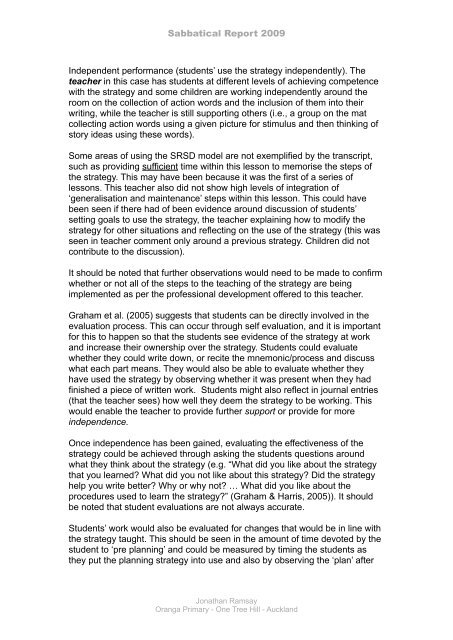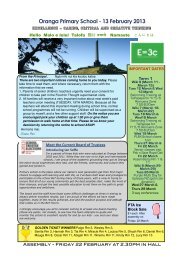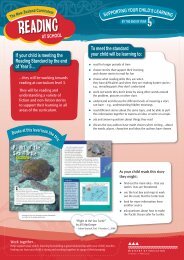Sabbatical Report - Oranga School Website
Sabbatical Report - Oranga School Website
Sabbatical Report - Oranga School Website
You also want an ePaper? Increase the reach of your titles
YUMPU automatically turns print PDFs into web optimized ePapers that Google loves.
<strong>Sabbatical</strong> <strong>Report</strong> 2009<br />
Independent performance (students’ use the strategy independently). The<br />
teacher in this case has students at different levels of achieving competence<br />
with the strategy and some children are working independently around the<br />
room on the collection of action words and the inclusion of them into their<br />
writing, while the teacher is still supporting others (i.e., a group on the mat<br />
collecting action words using a given picture for stimulus and then thinking of<br />
story ideas using these words).<br />
Some areas of using the SRSD model are not exemplified by the transcript,<br />
such as providing sufficient time within this lesson to memorise the steps of<br />
the strategy. This may have been because it was the first of a series of<br />
lessons. This teacher also did not show high levels of integration of<br />
‘generalisation and maintenance’ steps within this lesson. This could have<br />
been seen if there had of been evidence around discussion of students’<br />
setting goals to use the strategy, the teacher explaining how to modify the<br />
strategy for other situations and reflecting on the use of the strategy (this was<br />
seen in teacher comment only around a previous strategy. Children did not<br />
contribute to the discussion).<br />
It should be noted that further observations would need to be made to confirm<br />
whether or not all of the steps to the teaching of the strategy are being<br />
implemented as per the professional development offered to this teacher.<br />
Graham et al. (2005) suggests that students can be directly involved in the<br />
evaluation process. This can occur through self evaluation, and it is important<br />
for this to happen so that the students see evidence of the strategy at work<br />
and increase their ownership over the strategy. Students could evaluate<br />
whether they could write down, or recite the mnemonic/process and discuss<br />
what each part means. They would also be able to evaluate whether they<br />
have used the strategy by observing whether it was present when they had<br />
finished a piece of written work. Students might also reflect in journal entries<br />
(that the teacher sees) how well they deem the strategy to be working. This<br />
would enable the teacher to provide further support or provide for more<br />
independence.<br />
Once independence has been gained, evaluating the effectiveness of the<br />
strategy could be achieved through asking the students questions around<br />
what they think about the strategy (e.g. “What did you like about the strategy<br />
that you learned? What did you not like about this strategy? Did the strategy<br />
help you write better? Why or why not? … What did you like about the<br />
procedures used to learn the strategy?” (Graham & Harris, 2005)). It should<br />
be noted that student evaluations are not always accurate.<br />
Students’ work would also be evaluated for changes that would be in line with<br />
the strategy taught. This should be seen in the amount of time devoted by the<br />
student to ‘pre planning’ and could be measured by timing the students as<br />
they put the planning strategy into use and also by observing the ‘plan’ after<br />
Jonathan Ramsay<br />
<strong>Oranga</strong> Primary - One Tree Hill - Auckland




